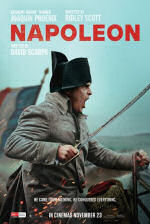|







 
|
 |
Napoleon (2023)
    
 |
Directed
by:
Ridley Scott |
COUNTRY
USA |
|
GENRE
Historical drama |
|
NORWEGIAN TITLE
Napoleon |
|
RUNNING
TIME
157 minutes |
|
Produced
by:
Ridley Scott
Kevin J. Walsh
Mark Huffam
Joaquin Phoenix |
Written by:
David Scarpa |
Review
Large-scale biopics of historical
figures will always have both a great advantage and a great disadvantage
going into the project, which is demonstrated perfectly with Ridley Scott's latest foray into
the genre. On the one hand, the life and
times of the great French military leader and ultimately failed
emperor Napoleon Bonaparte is so fascinating that any adaptation of a
magnitude such as this can hardly fail to impress. On the other
hand, most of this is known material for the average viewer, which
means that one of Scott's most important tasks is to breath new life
into the story and tell it in a way which sets it apart and embellishes
it. He both fails and succeeds in this with Napoleon. One of the
main achievements of this film are the battle scenes, which have a
wonderful sense of
space and scope. Among Napoleon's most prominent skills was his
tactical prowess on the battlefield, and there are one or two
decisive sequences in here which illustrate this in a detailed and
quite engrossing manner. Another aspect which almost is able to
transport you back to 18th and 19th century France is the film's
thorough dissection of the complicated, life-long love affair
between Napoleon (Joaquin Phoenix) and Joséphine de Beauharnais
(Vanessa Kirby). Through their correspondence, we get a sense of the
many conflicting emotions they had, and why a high-profile relationship in their day and situation was so difficult. In a handful of
scenes, Phoenix and Kirby are able to generate an intensity in their
interplay which lifts this from interesting to captivating.
Unfortunately, the latter cannot be said of Napoleon in its
entirety. Scott isn't able to give his film any sort of real French
identity, and the feeling of authenticity suffers for it. Phoenix'
take on Napoleon lacks both Frenchness and a charisma which would
help explain
the man's societal success. There are
also too many segments which feel bogged down by the director's
inability to bridge the temporal gap between our time and
Napoleon's. That isn't to say he doesn't try or even occasionally succeed quite well, but as a total for a film of this
scope, running time and historical relevance, Napoleon falls a little short – which
incidentally could be said to mirror the
man himself quite well.
|
|